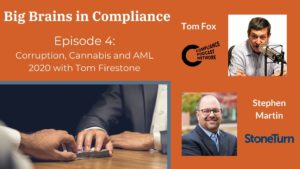
Tom Fox and Stephen Martin are talking with Tom Firestone, Partner at Baker & McKenzie, in this week’s episode of Big Brains in Compliance. Before joining Baker & McKenzie, Tom worked at the Department of Justice for 14 years, including as Resident Legal Advisor at the US embassy in Moscow. He, Tom Fox, and Stephen Martin discuss trading ethically in Eastern Europe, key issues in the cannabis industry, and what compliance professionals need to know coming out of the AML act of 2020.
Doing Business in the CIS Region
Stephen asks Tom, “[What] are some of the real issues you see now especially in Eastern Europe?” He responds that the issues are complicated and often relate to secret ownership of business partners by government officials. A lot of his work involved “unpacking these layers of corporate structures to figure out who’s behind them… and can you do business with this person.” He explains to Stephen and Tom why these issues arose and that it requires you to do detailed analysis before moving ahead. Triangular payment arrangements – often a tax evasion scheme – is one red flag compliance officers should look out for, he points out. It boils down to case-by-case investigation, and then making a decision based on your overall judgment.
Cannabis is a Grey Area
“We review every cannabis-related engagement from anywhere in the world… to determine whether or not it’s something we can do legally and whether or not we’re comfortable with it,” Tom says. He comments that federal law contradicts state law in many jurisdictions because those states have legalized cannabis. “You have a very grey legal area of a very grey legal framework,” he remarks. The industry is heavily influenced by politics and many people in the industry come from a criminal background. You have to evaluate all the risks before moving forward, he advises. He predicts that the federal government will adopt a hands-off policy and defer to state law in these issues. It’s a fascinating area for lawyers because it draws on key skills. Ultimately, “it’s about verifying business partners, about verifying the legitimacy of licenses, and it’s about due diligence,” Tom comments.
Prosecuting the Demand Side
Tom Fox asks why Tom advocates for a demand-side penalty to be added to the FCPA. Tom Firestone responds that in reality bribes are initiated as often by the recipient as the giver. Both are equally culpable, so both should be prosecuted. Other jurisdictions, such as the UK, prosecute both sides; however, the US has forgone prosecuting the recipient side mostly for political and diplomatic reasons. Instead, they are going after these bad actors in a roundabout way.
The Future of FCPA and AML 2020
FCPA enforcement is here to stay, Tom Firestone predicts. There are fewer enforcement actions in 2021, but that’s just the natural ebb and flow. Tom Fox asks him what other white-collar priorities he expects from the Biden administration. He responds that he expects to see more sanctions, as well as SEC regulatory, environmental, and antitrust enforcements. Prosecuting domestic terrorists and police brutality are also this administration’s stated priorities.
Tom Fox and Tom Firestone discuss what the AML act of 2020 means for compliance professionals. It comes down to knowing more about who you’re doing business with, Tom Firestone remarks: “It behooves compliance professionals to pay more attention to who their customers are and where they got the money from.” Stephen asks about future trends in compliance. Tom Firestone lists three areas he believes will define compliance in the near future. In the end, good compliance is about good day-to-day ethics, Tom reminds listeners. “If you have good day-to-day compliance with good day-to-day business ethics, you will protect yourself against a full host of risks that are out there.”
Resources
Tom Firestone on LinkedIn
Baker McKenzie
tom.firestone@bakermckenzie.com


